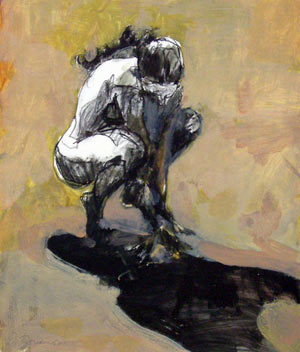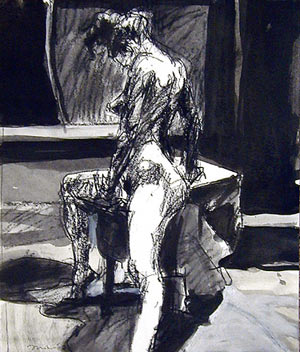Kim Frohsin
Wolf Kahn once told me that an artist must always be trying to solve a problem. Other well known artists have said the same thing this way: once you get good at something, stop and push past whatever it is that you do easily and well. It’s a nice idea. The notion keeps us from getting into ruts, even lucrative ruts that drive careers. The emphasis is not on product but on growth, on becoming more.
My “problem” as it were is that I have competing and somewhat conflictual interests: I love the very late Monet paintings that are symphonies of virtuosity, tangles of overt brushstrokes that make Pollock’s drip paintings look soulless and formulaic. On the other hand, I love work, like the flat abstraction of Diebenkorn’s Ocean Park series, that are virtually without brush strokes at all, except that there are those wonderful layers of inspired scumbling that make the artist visible just the same. Diebenkorn covered a lot of ground, as most of you know, and it is his contribution, along with such artists as David Park, Elmer Bischoff, James Weeks – and later Nathan Olivera and Manuel Neri – as Bay Area Figurative artist that really help provide me a direction. In their work one can find that powerful blend of simplicity, verve, and sensuality that seems to marry abstraction and three dimensional space.
If there were a contemporary generation to the Bay Area Figurative movement, which first emerged in the 50s and 60s, I would nominate Kim Frohsin for inclusion. She might resist such a categorization but her work, at any rate, also helps me think about “my problem.”


The two images above (mixed media: on the left: ink, stabilo pencil, gouache, paper; and on the right: stabilo pencil, ink, watercolor crayon, paper) are representative of Kim’s aesthetic. As with many of her figure drawings, one can see that she has reduced everything to three values (dark, middle, and light) with the paper left open as the light. Notice also how non-literal everything is. The right foot of the figure on the left, for example, isn’t drawn as a “foot;” rather it is a dark that melts into the cast shadow. Notice, too, how the floor/background becomes a variety of subtle color, not calculated but discovered, that at the same time provides a tonality in which the figure is located. The figure on the right reminds me of Kahn’s criticism of my own work: “your work isn’t messy enough.” Kim’s is messy just right: it seems to be the by-product of a visual exploration, one that suggests that she isn’t looking for results so much as she works, but rather is immersed in a sensual rush that perculates as she converses with what she sees. She not only seems to be exploring but finding, finding bits and pieces, splats and scratches that lie beyond the facts. This, to me, is the mark of a serious artist. The subject is not the figure in the end. The figure was just the prompt, the point of departure. The subject is always Kim.
Check out her website (http://kimfrohsin.com). Look at the way she treats bread and lemons. Notice that her choice of subject (tea bags and fortune cookies) has zip to do with some inherent beauty and everything to do with what she sees and feels visually. Her “airplane” series (as in paper airplanes!) reveals that extraordinary capacity to make visual poetry out of practically nothing (much in the way Diebenkorn could paint a pair of scissors on a table and convey greater depth and mystery than a Renaissance painter’s pieta).
When I lived in San Francisco, I knew Kim. Her work was impressive then. But I had not been aware of what she has been doing this past decade so it was a delight to spend some time with her website and realize that her work speaks to me even more these days.
Kahn was right. I need to get messier. Kim seems to be admonishing me as well: keep things simple. Paint things that most everyone else walks by. Let the struggle show. Nothing like a good problem to keep the whole thing moving forward.
1 Comment
Address
Via Teresio Olivelli, 20
22021 Bellagio (CO)
Italy
+39 338 975 7135
Open Hours
Tuesday - Saturday: 11:00am – 6:00pm
Sunday - Monday: 1:00pm – 6:00pm
Follow
Kim Frohsin
1 Comment
-
Pia Henderson on May 25, 2012 at 3:02 pm
I absolutely agree and love your generosity towards a fellow maker.
Address
Via Teresio Olivelli, 20
22021 Bellagio (CO)
Italy
+39 338 975 7135
Open Hours
Tuesday - Saturday: 11:00am – 6:00pm
Sunday - Monday: 1:00pm – 6:00pm

I absolutely agree and love your generosity towards a fellow maker.